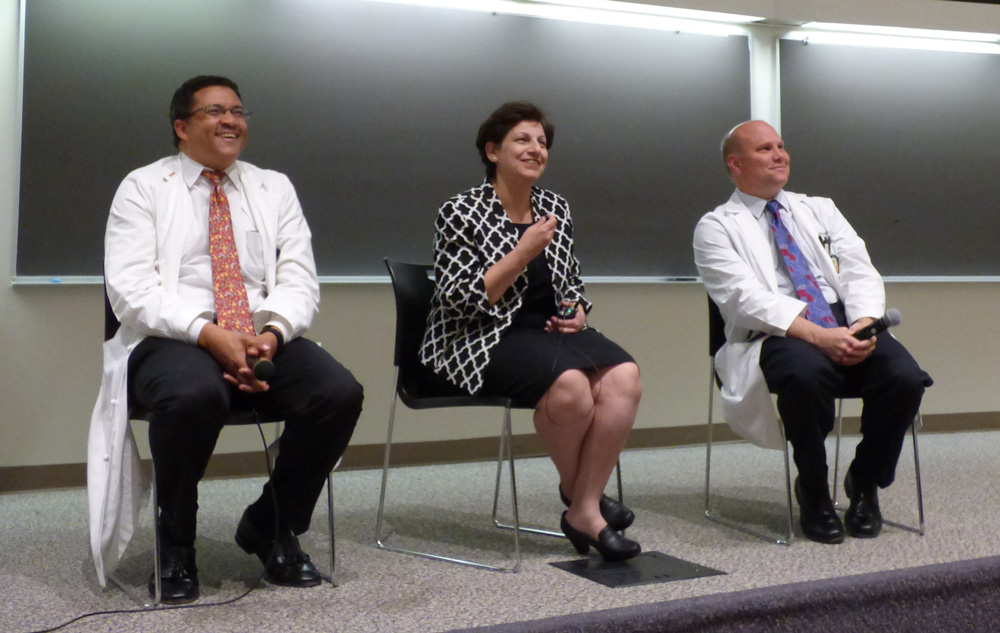 Drs. Carlton Young, Mona Fouad and Craig Hoesley during the panel discussion at the Diversity Retreat on May 16.On Monday, May 16, medical students massed in Volker Hall’s Lecture Room A, gathering boxed lunches and settling in for a discussion of the Diversity Engagement Survey. The Diversity Engagement Survey, which was administered by the UAB School of Medicine in fall 2015 to measure the knowledge of, and involvement with, diversity initiatives.
Drs. Carlton Young, Mona Fouad and Craig Hoesley during the panel discussion at the Diversity Retreat on May 16.On Monday, May 16, medical students massed in Volker Hall’s Lecture Room A, gathering boxed lunches and settling in for a discussion of the Diversity Engagement Survey. The Diversity Engagement Survey, which was administered by the UAB School of Medicine in fall 2015 to measure the knowledge of, and involvement with, diversity initiatives. The Diversity Engagement Survey was developed by the Association of American Medical Colleges to provide an accurate framework for assessing the relative success of diversity and inclusion initiatives – or the impact of the absence of these initiatives. The UABSOM was the 15th school to conduct this survey, which included all medical students, faculty and trainees.
The May 16 Diversity Engagement retreat was an opportunity to share the results of the survey with the medical students and ask for feedback as the School of Medicine pushes forward with future diversity initiatives.
Selwyn Vickers, M.D., F.A.C.S., senior vice president for Medicine and dean of the School of Medicine, opened the retreat with personal stories of his experiences as a medical student at John Hopkins. He explained that diversity wasn’t simply a question of race – it involved bringing a wide range of experiences to the table.
“In the South,” he said, “everyone believed basically similar things. As I pursued my education, I realized that there were people from all walks of life who believed many different things, just as strongly as I did.”
Highlighting diversity as critical to the development of excellence, as well as necessary to becoming capable and effective physicians, Vickers said becoming a diverse medical school was not about “changing the numbers.” Diversity, he said, had to do with bringing people from all walks of life and a multiplicity of perspectives together.
Carlton Young, M.D., assistant dean for Medical Student Diversity and Inclusion, presented the results of the Diversity Engagement Survey. The survey contained 23 questions, dealing with issues ranging from the level of trust the students had with their institution to the measure of respect they felt they received for their efforts. Sense of camaraderie and level of involvement with the vision and mission of the school were also evaluated.
Although the responses of UAB medical students indicated that they lagged behind the benchmark mean in most areas, compared to the other 14 medical schools surveyed, the gap wasn’t large, and in one measure – respect – UAB students scored above the mean.
The survey was designed to measure the students’ perceptions of diversity initiatives, rather than the relative success or failure of the initiatives themselves, but Young was quick to highlight the need for student input to address the areas in which some improvement was necessary. “We want to make sure that we can improve our ability to meet your concerns,” he said. “If we don’t hear from you, we can’t make cogent changes.
Young’s remarks were followed by a panel question and answer session which included not only Young, but also Craig Hoesley, M.D., senior associate dean for Medical Education, and Mona Fouad, M.D., MPH, senior associate dean for Diversity and Inclusion.
One student asked whether it was possible to ensure that future students to the UAB School of Medicine were open to principles of equity and inclusion.
“We don’t want to force diversity on anyone,” Fouad responded. “Instead, we need your help to change the culture. We don’t want to count numbers; we want to appreciate each other’s’ differences. We hope that ultimately diversity is something that we don’t have to think about, it’s something that happens naturally.”
An anonymous question expressed the concern that increasing diversity in the medical school would mean sacrificing the pursuit of “the best and the brightest.”
Young firmly negated this notion. “We look at a multitude of factors in admission,” he said. “We select students who we know can succeed. We can have diversity and excellence at the same time.”
Fouad echoed this sentiment. “If there were a sacrifice of quality,” she said, “we would have seen that in the numbers. We’re not looking to lower the score requirements for anyone.”
Hoesley added, “As I looked at the data and comments from this survey, I realized that we can do better – but it only works if you chip in to help. We want you to partner with us. We haven’t done enough to communicate to you why this is important. Unless we have diversity, it’s going to affect your quality as a physician.”